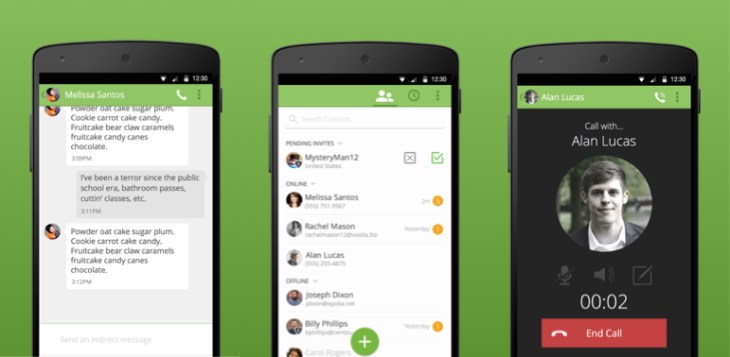In the rush of new services for consumers that are concerned about their data privacy, make room for another messaging app. Peer-to-peer file distribution service BitTorrent is today announcing the public availability of Bleep — its encrypted P2P chat app for voice calls and texts that is still in alpha — with Mac and Android apps now available to download, in addition to the existing Windows app that was already part of the invite-only, closed alpha.
An iOS app, a BitTorrent spokesperson tells me, is in the works for a future release.
BitTorrent — once more notorious for enabling piracy, now running in less turbulent waters as it courts advertisers and big-name partners — has been one of the more outspoken internet companies on the issue of data privacy these days in the wake of the NSA snooping revelations. Bleep is a product of that position.
BitTorrent says Bleep is fully encrypted end to end, with messages and other data only stored locally on your device. Users also have the ability to delete their message history, “leaving no trace of conversation behind.”
The thinking here is that a chat app built on a distributed, peer-to-peer architecture like the kind that BitTorrent uses is more secure than one built on a cloud-based architecture.
“Cloud-based services store personal information and private moments on servers, making them vulnerable to attacks,”writes Jaehee Lee, a product manager overseeing Bleep, in a blog post. “Privacy should not be up for debate. And privacy should not be hard to achieve.”
One way that Bleep achieves this is through a server-less architecture (which is built around a distributed hash table, or DHT, that Bleep product manager Farid Fadaie says in a technical post is being continually upgraded for better scale while Bleep’s in alpha).
Another is in how consumers can interface with the app: you can sign into the service using your email or mobile number, or you can access your client in incognito mode — “no Personally Identifiable Information is necessary.”
However, if you so choose, you can also import your Google address book contacts, and to invite friends to Bleep via email, SMS, QR code, or a public key. BitTorrent says you can now move an existing account to an Android device and receive inbound messages across all devices.
Bleep itself has been in the works for a year already. The first, closed version of the service, then simply called BitTorrent Chat, was launched in September 2013. Then, earlier this year, the company started to fill in more details, eventually unveiling the Bleep name as it transitioned to an invite-only, closed Alpha for Windows users. (“Bleep” refers to the privacy level of the app — as in, we have no way of knowing or capturing what you say in your messages because everything you say is no more than a “bleep.”)
This latest iteration of Bleep is now open to anyone who wants to try it, Lee writes, while the company continues to receive user feedback from previous and new testers.
The alpha-ness of the app has a few caveats, Lee notes.
It includes the fact that Android users need to set the app to WiFi-only unless you have an unlimited data plan, a temporary measure “while we iron out [issues] related to battery and data-plan.”
Also there are still glitches in terms of porting data between desktop and mobile: you can move a username from desktop to mobile, but not the other way. The messages can be received across all devices but your sent history is not.
And, as before, you cannot have asynchronous communication, with group messages and photos only getting delivered when users are online (similar to a problem that Skype, which had originally been built on an exclusively-P2P architecture, also used to have).
There are also questions around how BitTorrent may eventually choose to turn the service from a useful resource into a business — monetization being a lingering issue around other recently-launched BitTorrent services, such as Bundles (BitTorrent has yet to introduce the pay gates that it has said would become a part of the product).
On the subject of Bleep monetization, BitTorrent tells me that “There are several possibilities, including the potential to license the engine we built for Bleep. But for the time being the focus is on building the best possible serverless communications app possible. In typical Silicon Valley fashion, we’ll evaluate monetization models down the line.”
With services like Wickr, Snapchat, Confide, still-to-come Hemlis and many, many others also tapping into the movement to have more private messaging services, there are also questions of how Bleep may integrate with the wider world of apps. Asked if there are any plans for white-label models to power other apps, along the lines of Wickr’s strategy, or integration with other apps, Bittorent says “Both are in consideration.”
“While we are not announcing any details on monetizing the engine, it can work with any communications application and we are interested in discussing with interested parties,” the spokesperson says.
